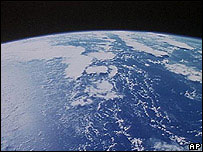
Growing demand eats into Earth's natural capital, say the authors
|
Rising consumption of natural resources means that humans began "eating the planet" on 9 October, a study suggests.
The date symbolised the day of the year when people's demands exceeded the Earth's ability to supply resources and absorb the demands placed upon it.
The figures' authors said the world first "ecological debt day" fell on 19 December 1987, but economic growth had seen it fall earlier each year.
The data was produced by a US-based think-tank, Global Footprint Network.
The New Economics Foundation (Nef), a UK think-tank that helped compile the report, had published a study that said Britain's "ecological debt day" in 2006 fell on 16 April.
The authors said this year's global ecological debt day meant that it would take the Earth 15 months to regenerate what was consumed this year.
 |
WORLD 'ECOLOGICAL DEBT DAY'
1987 - 19 December
1990 - 7 December
1995 - 21 November
2000 - 1 November
2005 - 11 October
2006 - 9 October
(Source: Global Footprint Network/Nef)
|
"By living so far beyond our environmental means and running up ecological debts means we make two mistakes," said Andrew Simms, Nef's policy director.
"First, we deny millions globally who already lack access to sufficient land, food and clean water the chance to meet their needs. Secondly, we put the planet's life support mechanisms in peril," he added.
'Eco-footprints'
The findings are based on the concept of "ecological footprints", a system of measuring how much land and water a human population needs to produce the resources it consumes and absorb the resulting waste.
Global Footprint Network's executive director, Mathis Wackernagel, said humanity was living off its "ecological credit card" and was "liquidating the planet's natural resources".
"While this can be done for a short while, overshoot ultimately leads to the depletion of resources, such as forests, oceans and agricultural land, upon which our economy depends," Mr Wackernagel said.
Fredrik Erixon, director of the European Centre for International Political Economy (Ecipe), a Brussels-based think tank, said he applauded the authors on their innovative way of focusing attention to the issue of resource depletion.
But he added he found the concept of ecological debt to be "quite ludicrous".
"When it comes to using footprints as a way to follow the micro effects of various economic behaviours on the environment, it can be quite good," Mr Erixon said.
"But the way they are collecting and assessing information is wrong. We don't really get any serious information out of this."
He also questioned the use of the term "debt": "A debt is where you have over-savings in one area of the economy, and under-savings in another.
"Then you have a transfer of savings from one actor to another in the form of a loan. But who are we indebted to?" Mr Erixon asked.
"Perhaps 'ecological exuberance' is better than ecological debt."
He added that history had shown that technological advances had led to more efficient uses of natural resources, and had sustained economic growth.


~RS~q~RS~~RS~z~RS~18~RS~)